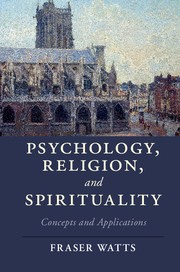Book contents
- Frontmatter
- Dedication
- Contents
- Preface
- 1 Concepts and Approaches
- 2 Psychoanalysis
- 3 Genetics and Evolution
- 4 Brain and Cognition
- 5 Religious Experience
- 6 Religious Practices
- 7 Religious Beliefs and Thinking
- 8 Spirituality
- 9 Developmental Aspects
- 10 Varieties and Types
- 11 Health and Adjustment
- 12 Personal Transformation
- 13 Scripture and Doctrine
- 14 Human Nature and Personality
- 15 Summing-Up
- Further Reading
- References
- Index
- Frontmatter
- Dedication
- Contents
- Preface
- 1 Concepts and Approaches
- 2 Psychoanalysis
- 3 Genetics and Evolution
- 4 Brain and Cognition
- 5 Religious Experience
- 6 Religious Practices
- 7 Religious Beliefs and Thinking
- 8 Spirituality
- 9 Developmental Aspects
- 10 Varieties and Types
- 11 Health and Adjustment
- 12 Personal Transformation
- 13 Scripture and Doctrine
- 14 Human Nature and Personality
- 15 Summing-Up
- Further Reading
- References
- Index
Summary
We will now turn to studies of religion from the perspectives of neuroscience and cognitive psychology. It is a relatively new area in the psychology of religion and one that has recently aroused much interest.
Neural Reductionism
First, let us dispose of the bogey of neural reductionism. It is an issue raised by William James (2012/1902), who devoted the first chapter of his classic Varieties of Religious Experience to this issue, which he called “medical materialism.” The book is based on James's Gifford Lectures given at the University of Edinburgh in 1901 and 1902, and it has become the classic text of the early days of psychology of religion. James had propounded a rather materialist theory of emotions (see Dixon, 2006), but clearly he wanted to be less materialist about religion. He made an important distinction between two kinds of judgments, existential judgments concerned with how something originates and spiritual judgments concerned with its value. It is a version of the well-known distinction between fact and value. James's point is that one cannot be reduced to the other, and that knowing how religious experience arises does not settle questions of its value and significance. He is surely right in his general point that admitting that spiritual experience has an organic basis does not invalidate it as spiritual experience, a point of much contemporary relevance. He is also scathing about the then fashionable survival theory of religion (which has echoes in current evolutionary theory of religion). James's chapter still repays careful study, but then he is the most distinguished philosopher ever to have worked on the psychology of religion.
There is no justification for using research about the role of the physical brain in religion to reach reductionist conclusions about religion. Equally, it is worth emphasizing that religious believers have no reason to be disconcerted by research on the role of the physical brain in religion. From a theological point of view, the brain is part of God's creation. If there is a God, and he wishes to reveal himself to humanity through religion, no theological argument suggests that God would want somehow to bypass the physical brain. It is often assumed in these debates that religious people are committed to a dualistic view of the human person.
- Type
- Chapter
- Information
- Psychology, Religion, and SpiritualityConcepts and Applications, pp. 39 - 51Publisher: Cambridge University PressPrint publication year: 2017



